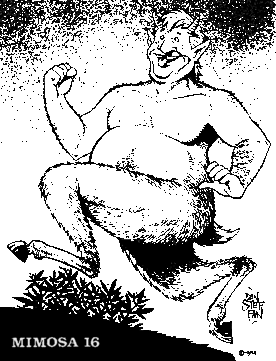
Science fiction fandom or SF fandom is a community or fandom of people interested in science fiction in contact with one another based upon that interest. SF fandom has a life of its own, but not much in the way of formal organization.

James White was a Northern Irish author of science fiction novellas, short stories and novels. He was born in Belfast and returned there after spending some early years in Canada. After a few years working in the clothing industry, he worked at Short Brothers Ltd., an aircraft company based in Belfast, from 1965 until taking early retirement in 1984 as a result of diabetes. White married Margaret Sarah Martin, another science fiction fan, in 1955 and the couple had three children. He died of a stroke.

Tom Reamy was an American science fiction and fantasy author and a key figure in 1960s and 1970s science fiction fandom. He died at age 42 prior to the publication of his first novel; his work is primarily dark fantasy.
Alexei Panshin was an American writer and science fiction critic. He wrote several critical works and several novels, including the 1968 Nebula Award–winning novel Rite of Passage and, with his wife Cory Panshin, the 1990 Hugo Award–winning study of science fiction The World Beyond the Hill.

Sam Moskowitz was an American writer, critic, and historian of science fiction.

Michael Diamond Resnick was an American science fiction writer and editor. He won five Hugo awards and a Nebula award, and was the guest of honor at Chicon 7. He was the executive editor of the defunct magazine Jim Baen's Universe, and the creator and editor of Galaxy's Edge magazine.

David Rowland Langford is a British author, editor, and critic, largely active within the science fiction field. He publishes the science-fiction fanzine and newsletter Ansible and holds the all-time record for most Hugo Awards, with a total of 29 wins.
Mike Glyer is both the editor and publisher of the long-running science fiction fan newszine File 770. He has won the Hugo Award 12 times in two categories: File 770 won the Best Fanzine Hugo in 1984, 1985, 1989, 2000, 2001, 2008, 2016 and 2018. Glyer won the Best Fan Writer Hugo in 1984, 1986, 1988, and 2016. The 1982 World Science Fiction Convention (Worldcon) committee presented Glyer a special award in 1982 for "Keeping the Fan in Fanzine Publishing."
Harry Warner Jr. was an American journalist. He spent 40 years working for the Hagerstown, Maryland, Herald-Mail.

Mimosa was a science fiction fanzine edited by Richard Lynch and Nicki Lynch. It won six Hugo Awards for Best Fanzine and was nominated a total of 14 times (1991-2004). The headquarters was in Gaithersburg, Maryland.

The 10th World Science Fiction Convention, or the tenth instance of Worldcon, was held on the Labor Day weekend, 30 August – 1 September 1952, at the Morrison Hotel in Chicago, and was chaired by Julian May.
The Washington Science Fiction Association (WSFA) is the oldest science fiction club in the Washington, D.C. area. It is also one of the oldest science fiction clubs, founded in 1947 by seven fans who met at that year's Worldcon in Philadelphia, the fifth Worldcon held.
Advent:Publishers is an American publishing house. It was founded by Earl Kemp and other members of the University of Chicago Science Fiction Club, including Sidney Coleman, in 1955, to publish criticism, history, and bibliography of the science fiction field, beginning with Damon Knight's In Search of Wonder.
The 46th World Science Fiction Convention (Worldcon), also known as Nolacon II, was held on 1–5 September 1988 at the Marriott, Sheraton, and International Hotels, and the New Orleans Municipal Auditorium in New Orleans, Louisiana, United States.
The 51st World Science Fiction Convention (Worldcon), also known as ConFrancisco, was held on 2–6 September 1993 at the ANA Hotel, Parc Fifty Five, and Nikko Hotels and the Moscone Convention Center in San Francisco, California, United States.

A Wealth of Fable by Harry Warner, Jr., is a Hugo Award-winning history of science fiction fandom of the 1950s, an essential reference work in the field. It is a follow-up to Warner's All Our Yesterdays (ISBN 1-886778-13-2), which covered the 1940s, and helped to earn Warner a Hugo Award in 1969.
Philadelphia Science Fiction Society (PSFS) is a science fiction club in Philadelphia, Pennsylvania. Established in 1936, PSFS is the second oldest extant group in science fiction fandom, and hosted what is considered by some to be the first science fiction convention. Anyone living in the greater Philadelphia area and interested in science fiction, fantasy, horror, whether written or on TV or in the movies; SF, fantasy, and horror art; gaming, board games or video games; comic books/graphic novels; and related arts is welcome.
List of works by American science fiction author Mike Resnick.

Futuria Fantasia was an American science fiction fanzine created by Ray Bradbury in 1938, when he was 18 years old. Though only four issues of the fanzine were published, its list of contributors included Hannes Bok, Forrest J. Ackerman, Henry Kuttner, Damon Knight, and Robert A. Heinlein.
Myrtle Rebecca Smith Gray Nolan, known to science fiction history as Morojo or sometimes Myrtle R Douglas, was a science fiction fan, fanzine publisher, and cosplay pioneer from Los Angeles.










